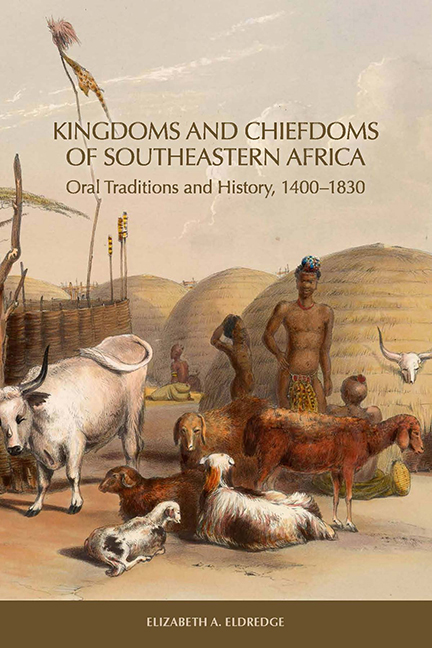Book contents
- Frontmatter
- Contents
- List of Illustrations
- Preface
- 1 History and Oral Traditions in Southeastern Africa
- 2 Oral Traditions in the Reconstruction of Southern African History
- 3 Shipwreck Survivor Accounts from the Sixteenth and Seventeenth Centuries
- 4 Founding Families and Chiefdoms East of the Drakensberg
- 5 Maputo Bay Peoples and Chiefdoms before 1740
- 6 Maputo Bay, 1740–1820
- 7 Eastern Chiefdoms of Southern Africa, 1740–1815
- 8 Zulu Conquests and the Consolidation of Power, 1815–21
- 9 Military Campaigns, Migrations, and Political Reconfiguration
- 10 Ancestors, Descent Lines, and Chiefdoms West of the Drakensberg before 1820
- 11 The Caledon River Valley and the BaSotho of Moshoeshoe, 1821–33
- 12 The Expansion of the European Presence at Maputo Bay, 1821–33
- 13 Southern African Kingdoms on the Eve of Colonization
- Appendix A Ama Swazi King Lists
- Appendix B Chronology of Conflicts, Migrations, and Political Reconfiguration East of the Drakensberg in the Era of Shaka
- Appendix C Interviewees from the James Stuart Collection of Oral Traditions
- Notes
- Bibliography
- Index
4 - Founding Families and Chiefdoms East of the Drakensberg
Published online by Cambridge University Press: 14 March 2018
- Frontmatter
- Contents
- List of Illustrations
- Preface
- 1 History and Oral Traditions in Southeastern Africa
- 2 Oral Traditions in the Reconstruction of Southern African History
- 3 Shipwreck Survivor Accounts from the Sixteenth and Seventeenth Centuries
- 4 Founding Families and Chiefdoms East of the Drakensberg
- 5 Maputo Bay Peoples and Chiefdoms before 1740
- 6 Maputo Bay, 1740–1820
- 7 Eastern Chiefdoms of Southern Africa, 1740–1815
- 8 Zulu Conquests and the Consolidation of Power, 1815–21
- 9 Military Campaigns, Migrations, and Political Reconfiguration
- 10 Ancestors, Descent Lines, and Chiefdoms West of the Drakensberg before 1820
- 11 The Caledon River Valley and the BaSotho of Moshoeshoe, 1821–33
- 12 The Expansion of the European Presence at Maputo Bay, 1821–33
- 13 Southern African Kingdoms on the Eve of Colonization
- Appendix A Ama Swazi King Lists
- Appendix B Chronology of Conflicts, Migrations, and Political Reconfiguration East of the Drakensberg in the Era of Shaka
- Appendix C Interviewees from the James Stuart Collection of Oral Traditions
- Notes
- Bibliography
- Index
Summary
All across southeastern Africa early social organization was premised on the leadership of the senior member of a prominent family who made determinations of land allocation and land use, oversaw judicial hearings regarding disputes or the punishment of a criminal, and ensured the allocation of food resources to prevent starvation. Providing for people who would otherwise become indigent was the responsibility of the chief, who could use tributary payments or judicial fines for this purpose. The origins of small chiefdoms as extended families joined by those who intermarried with them or attached themselves to the chief through declaring their allegiance prompted westerners to think of these as “clans,” a group of people who considered themselves to be collectively descended from a distant ancestor. The easily observed process of the subdivision of these social groups in new generations created distinctive groups with known origins from a recent ancestor, who was perhaps still living or from only a generation earlier, and this prompted the western designation of subbranches of clans as “lineages,” several of which made up a clan. These terms are useful for the specific purpose of explaining the most obvious feature of social organization, but they obscure the equally prevalent processes of amalgamation of social segments led by prominent family members who with their followers collectively joined another chiefdom. Such a voluntary submission to another political authority positioned the newcomers in a subordinate status, with both obligations and privileges attached to such proffered group allegiance. The attachment of outsiders, as individuals, a family, or followers of a minor chief to a more powerful chief who headed a prominent family and attracted numerous dependents in a socially based patronage system created what are more accurately thought of as chiefdoms. Thus a chiefdom was a socially based political unit that included not only the biological descendants of a known or distant ancestor but also all the people who over time came to be attached to that leader and the family from which he hailed.
- Type
- Chapter
- Information
- Kingdoms and Chiefdoms of Southeastern AfricaOral Traditions and History, 1400–1830, pp. 89 - 116Publisher: Boydell & BrewerPrint publication year: 2015

